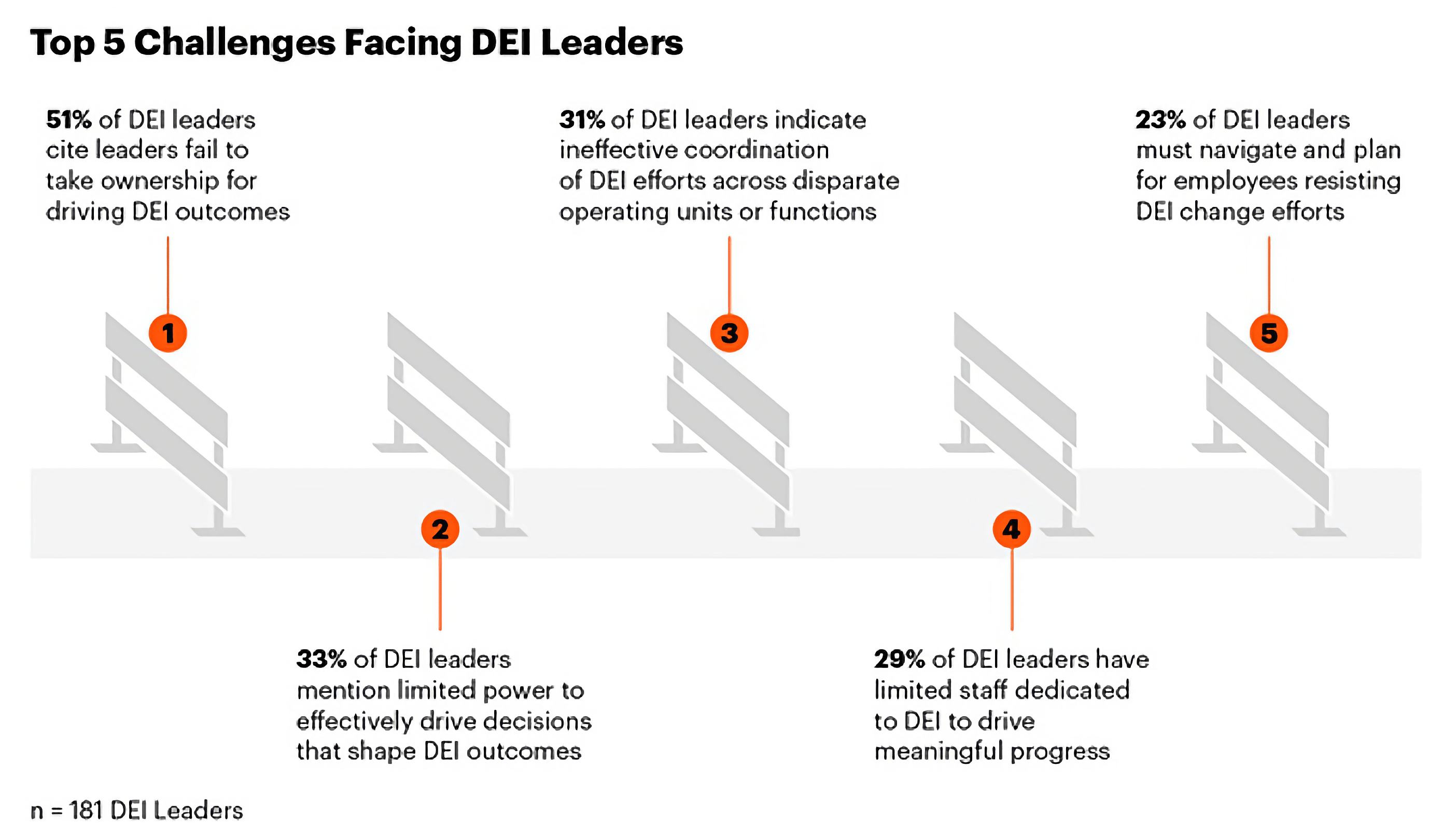Beyond Good Intentions: How Authentic DEI Programs Drive Profitability
It’s true, C-suite endorsement of companywide diversity, equity and inclusion efforts has decreased 18% in the past two years. The chilling effect is real. It’s also very unfortunate but from my chair presents an unprecedented opportunity for businesses and individuals. First let’s explore why the most recent approaches haven’t worked. Because I’m a marketing leader and data-driven, let’s start with some statistical insight.
According to a Gartner report published in January, business leaders failing to take ownership of DEI progress is the number one challenge DEI leaders are experiencing and creating ineffective outcomes.

Source: Gartner (January 2023)
I’d add there are other challenges contributing significantly to the DEI ineffectiveness. The top two are lack of authentically being centered as a core business initiative as opposed to an HR add-on or stand-alone effort and the other is misaligned measurement of the impact and success of DEI in terms of business metrics that translate to shareholder value and/or profitability in addition to the demographic and other soft skill metrics.
One side of this debate would say, DEI leaders and efforts should not be spoken of in terms of revenue because it is a human centric element that businesses need to care about. I agree, it is a human centric element that businesses need to care about. The other side of the debate is that DEI and even ESG efforts are independent of business performance and offer ways to claim success on matters that offer no investor returns. To this side, I say I understand your perspective because these efforts historically were positioned as human and environmentally centered addon’s that weren’t integrated and typically weren’t always measured in terms of business and shareholder value.
Hear me out. As a revenue owner in the business, I can tell you that if I care for people and miss my number most likely, I will be caring for people from a different chair than as a revenue owner. I can also say that as a business leader driving revenue growth and shareholder value culture eats strategy for breakfast and if I don’t evolve and modernize my business culture and care for my teams, there will be friction, retention issues and that will show in the brand and be felt in the customer experience. I don’t care how great the strategy is, the culture of your company which shows up in your brand will consume or diminish the results and outcomes. That means revenue growth and shareholder value are not being optimized or maximized and businesses are in business to make money. To not measure DEI efforts in this way, we do a disservice which will cost the shareholders money in two ways.
One is employee churn and customer disconnect cost money and send both to your competitors. The second is in today’s modern and diverse world, to not create an authentically inclusive environment to attract, retain, empower, and promote diverse people and voices at every level of the company and not diversify your audience appeal is to ignore the value shift of the largest buying group in B2B business that want businesses to change the world by an overwhelming 75%. (Hall and Partners) which is lost profits. Three things that DEI does for a business that clearly impacts the bottom line and provides shareholder value is that it:
- Increases revenue, cash flow and employee retention
- Provides competitive advantage
- Expands market reach and relevancy
Let me back this up. According to the research, diverse companies enjoy:
- 2.3 times higher cash flow per employee - Deloitte.
- Found that inclusive teams improve team performance by up to 30% in high-diversity environments - Gartner.
- Companies with diverse management teams had a 19% increase in revenue compared to their less diverse counterparts - BCG.
- Diverse teams have a 60% improvement in decision-making - Cloverpop.
This should grab the attention of every CEO, board member and shareholder. It should also create the clear business case that DEI should be a central revenue centered business strategy tied to business outcomes and invested in as essential. This should also include the top leadership support and technology that will enable it to be properly measured like any other attribution model for reporting impact on the bottom line back to the business. This includes the way we view investing and scaling Marketing and Sales to drive profit in the business with the expectation and understanding of ramp time to include time to benefit. I’m not saying we stop measuring the demographic growth metrics typically measured for such efforts. Instead, I’m saying DEI is so essential to the bottom line, growth and relevancy of your business, you can’t afford to not connect it to revenue, brand, culture and customer outcomes.
As a leader and black woman who has been the only person of color and/or the only woman in a C-Suite with accountability for 40% of the company revenue as the marketing leader while owning the global DEI initiative for the company, I get that I look at this a little differently. Authentic, business centered and aligned, leadership supported, properly invested and measured DEI is the game changer you, your company, shareholders, employees current and future didn’t know you needed as a revenue driver and expansion lever. How often do you get to increase profits, do the right thing and make a legacy impact on the world all at the same time? DEI is good business and humanity at the same time so if I may borrow a phrase from Nike…just do it. And, if you want to do it right let’s talk.

